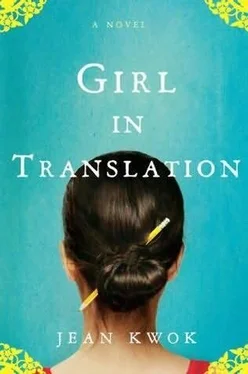The next day, I would start school. Ma would begin her job at the factory. That evening, she sat down with me on the mattress.
“Ah-Kim, I have been thinking about something since visiting the factory, and I realize I have no choice,” Ma said.
“What is it?”
“After you get out of school, I want you to come join me at the factory. I don’t want you here in this apartment by yourself, waiting for me every afternoon and evening. And I’m worried I won’t be able to do the finishing at the factory alone. The last woman who had my job had two sons who came to work with her. I have to ask you to come to the factory with me after school and help me there.”
“Of course, Ma. I always help you.” I put my hand on hers and smiled. In Hong Kong, I’d always dried the dishes and folded our laundry.
To my surprise, Ma’s face flushed, as if she were about to cry. “I know,” she said. “But this is something different. I’ve been to the factory.” She took me in her arms and squeezed so hard that I gasped, but by the time she pulled away, she had recovered control. She spoke softly, as if to herself. “The road we could follow in Hong Kong was a dead one. The only future I could see for us, for you, was here, where you could become whatever you wanted. Even though this isn’t what we’d imagined back home, we will be all right.”
“Mother and cub.”
Ma smiled. She started tucking the thin cotton blanket we’d brought from Hong Kong around me. Then she laid both of our jackets and her sweater over the blanket to keep me warm.
“Ma? Are we going to stay in this apartment?”
“I’ll talk to Aunt Paula tomorrow.” Ma got up and brought her violin case over to the mattress. She stood in the middle of that darkened living room with the cracked walls behind her, lifted her violin to her chin and began to play a Chinese lullaby.
I sighed. It seemed so long since I had heard Ma play, even though we’d been in America for only a week and a half. In Hong Kong, I’d heard her teaching music at school or giving private violin or piano lessons in our apartment, but she was usually too tired to play in the evenings when I went to bed. Now Ma was here and her music was just for me.
In that third week of November, I started school. Ma and I had a hard time finding it because it was many blocks away, beyond the area we had explored so far. This new neighborhood was cleaner than the vacant lots and empty storefronts that I had seen closer to our apartment. Aunt Paula had explained with pride that my official address would be different from the one where I actually lived. I should use this other address whenever anyone asked me.
“Why?” I’d asked.
“This is another of Mr. N.’s buildings. It’s one you wouldn’t be able to afford to live in, but using this address will allow you to go to a better school. Don’t you want that?”
“What’s the problem with the one I would go to normally?”
“Nothing!” Aunt Paula shook her head, clearly frustrated by my lack of gratitude for what she had done for me. “Go see if your ma needs you.”
Now, trying to find this better school, Ma and I walked across several big avenues and then past a number of governmental buildings with statues in front of them. Most of the people on the street were still black, but I saw more whites and lighter shades of black people, possibly Hispanics or other nationalities I couldn’t identify yet. I was shivering in my thin jacket. Ma had bought me the warmest one she could find in Hong Kong, but it was still made of acrylic, not wool.
We passed an apartment complex and a park. Finally, we found the school. It was a square concrete building with a large school yard and a flagpole waving the American flag. It was obvious I was late-the yard was empty of people-and we rushed up a broad flight of stairs and pushed open the heavy wooden door.
A black woman in a police uniform sat behind a desk, reading a book. She wore a tag that said “Security.”
We showed her the letter from the school. “Go downda hall, two fights up, classroom’s firsdur left,” she said, pointing. Then she picked up her book again.
I understood only that I had to go that way and so I started slowly down the long hallway. I saw Ma hesitate, unsure whether she was allowed to follow me. She glanced at the security guard, but Ma couldn’t say anything in English. I kept going, and at the staircase, I looked back to see Ma in the distance, a thin, uncertain figure, still standing by the guard’s desk. I hadn’t wished her good luck for her first day at the factory. I hadn’t even said good-bye. I wanted to run back and beg her to take me with her, but instead, I turned and made my way up the stairs.
After a bit of searching, I found the classroom and knocked weakly on the door.
A deep, muffled voice came from behind the door. “You’re late! Come in.”
I pushed it open. The teacher was a man. I learned later his name was Mr. Bogart. He was extremely tall, so that his forehead was level with the top of the blackboard, with a raspberry nose and a head bald as an egg. His green eyes seemed unnaturally light to me in his wide face and his stomach stuck out from under his shirt. He was writing English words on the blackboard, from left to right.
“Our new student eye-prezoom?” He gave a strange smile that made his lips disappear, then he looked at his watch and his lips reappeared. “You’re very late. What’s your exsu?”
I knew I had to answer so I guessed. “Kim Chang.”
He stared at me for a second. “I know what your name is,” he said, enunciating each word. “What’s your exshus?”
A few of the kids snickered. I took a quick look around: almost all black with two or three white kids. No other Chinese at all, no help in sight.
“Can’t you speak English? They said that you did.” This came out as a kind of grumbled whine. Who was he talking about? He took a breath. “Why are you late?”
This, I understood. “I sorry, sir,” I said. “We not find school.”
He frowned, then nodded and waved at an empty desk. “Go sit down. There.”
I sat down in the seat he had indicated, next to a chubby white girl with frizzy hair that stuck out in all directions. My fingers were shaking so much that I fumbled with my pencil case. It opened and everything in it clattered on the floor. Now most of the class laughed and I scrambled to pick up my things. I was so flushed I could feel the heat not only in my face but in my neck and chest. The white girl also bent down and picked up a pen and a pencil sharpener for me.
Mr. Bogart continued writing on the blackboard. I sat up straight and folded my hands behind my back to listen even though I couldn’t follow it at all.
He glanced at me. “Why are you see something that?”
“I sorry, sir,” I said, but I had no idea what I’d done wrong this time. I looked around at the other students. Most of them were sprawled in their chairs. Some had sunk so low that they were practically lying down, some were leaning on their elbows, a few were chewing gum. In Hong Kong, students must fold their hands behind their backs when the teacher is talking, to show respect. Slowly, I loosened my arms and placed my hands on the desk in front of me.
Shaking his head, Mr. Bogart turned back to the blackboard.
Our class went to the school cafeteria for lunch. I had never seen children behave the way these Americans did. They seemed to be hanging from the beams on the ceilings, shrieking. The lunchroom ladies roamed from table to table, yelling instructions no one heard. I had followed the other children and slid a tray across a long counter. Different ladies asked me questions and when I only nodded, they plopped foil-covered packages on my plate. I wound up with this: minced meat in the form of a saucer, potatoes that were not round but had been crushed into a pastelike substance, a sauce similar to soy sauce but less dark and salty, a roll and milk. I had hardly ever drunk cow’s milk before and it gave me a stomachache. The rest of the food was interesting, although there was no rice, so I felt as if I hadn’t really eaten.
Читать дальше












